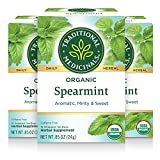Spearmint Tea for PCOS
Polycystic Ovary Syndrome (PCOS) is a hormonal disorder affecting millions of women of reproductive age. Common symptoms include irregular periods, excessive hair growth, acne, and weight gain. Natural remedies, like spearmint tea, have gained attention for their potential benefits in managing PCOS symptoms.
Spearmint Tea: The Basics

Spearmint tea is an herbal tea made from the leaves of the spearmint plant (Mentha spicata), a perennial herb native to Europe and Asia. It is part of the mint family, which also includes peppermint, among other varieties. Spearmint tea has a sweet, minty flavor and a refreshing aroma, making it a popular beverage enjoyed worldwide.
Spearmint tea offers several potential health benefits due to its refreshing flavor, aroma, and antioxidant properties. Here’s a list of some possible benefits:
Digestive aid: Spearmint tea has been traditionally used to soothe indigestion, relieve gas, and reduce stomach cramps. Its calming effects on the digestive system make it a popular remedy for various gastrointestinal issues.
Hormonal balance: Some studies suggest that spearmint tea may help regulate hormone levels, particularly in women with Polycystic Ovary Syndrome (PCOS), by lowering testosterone levels and potentially improving symptoms like acne and irregular periods.
Hirsutism management: Limited research indicates that spearmint tea may help reduce excessive hair growth (hirsutism) in women with PCOS by decreasing testosterone levels.
Stress relief: The refreshing aroma of spearmint tea is known for its calming effects, which can help reduce stress and promote relaxation.
Antioxidant properties: Spearmint tea is rich in antioxidants, like rosmarinic acid, which can help protect your body against free radicals and reduce inflammation.
Freshens breath: The natural minty flavor of spearmint tea can help combat bad breath and promote oral hygiene.
Respiratory relief: Spearmint tea has been used traditionally to alleviate respiratory issues, such as congestion and coughs, due to its menthol content, which can help relax airways and make breathing easier.
May support weight management: While more research is needed, some studies suggest that mint teas, including spearmint tea, can help suppress appetite and promote satiety, potentially aiding in weight management efforts.
Spearmint Tea and PCOS
Spearmint tea has gained attention as a potential natural remedy for managing Polycystic Ovary Syndrome (PCOS) symptoms. Some studies have suggested that spearmint tea may help regulate hormone levels, particularly by lowering testosterone levels, which can contribute to improvements in symptoms like hirsutism, acne, and irregular periods.
Benefits of Spearmint Tea for PCOS

Hirsutism management
Hirsutism is a common symptom of Polycystic Ovary Syndrome (PCOS) and is characterized by excessive hair growth in areas where men typically have hair, such as the face, chest, and back. This unwanted hair growth can be distressing for women and may impact their self-esteem and well-being.
Spearmint tea has been studied for its potential to manage hirsutism in women with PCOS. The possible benefits stem from the tea’s ability to lower testosterone levels. High levels of testosterone in women with PCOS can contribute to hirsutism, as this hormone stimulates hair follicles, leading to excessive hair growth.
In some studies, participants with PCOS consumed spearmint tea twice a day for a period of time (usually 30 days), and researchers observed reductions in free and total testosterone levels. This hormonal shift could potentially lead to a decrease in excessive hair growth and an improvement in hirsutism symptoms.
Hormonal balance
Spearmint tea may help promote hormonal balance, particularly in women with Polycystic Ovary Syndrome (PCOS), due to its potential impact on androgen levels, such as testosterone. Hormonal balance is crucial for overall health, and imbalances can lead to various health issues, including irregular periods, acne, and mood swings.
In some studies investigating the effects of spearmint tea on PCOS symptoms, participants consumed spearmint tea twice daily for a period (usually 30 days). Researchers observed that spearmint tea consumption led to reductions in free and total testosterone levels. By lowering testosterone levels, spearmint tea may help regulate hormone levels in women with PCOS, which can lead to potential improvements in symptoms related to hormonal imbalances.
Insulin resistance and inflammation
Spearmint tea contains antioxidant and anti-inflammatory properties might contribute to better insulin sensitivity indirectly. Insulin resistance is a condition where the body’s cells do not respond well to insulin, leading to higher blood sugar levels. It is a common issue in people with Polycystic Ovary Syndrome (PCOS) and can contribute to various symptoms and complications.
Spearmint tea is rich in antioxidants, such as rosmarinic acid, which can help reduce inflammation and oxidative stress in the body. Chronic inflammation and oxidative stress have been linked to insulin resistance, so it’s possible that by lowering inflammation and oxidative stress, spearmint tea could help improve insulin sensitivity.
Moreover, spearmint tea’s potential ability to regulate hormone levels, particularly by lowering testosterone levels in women with PCOS, might also have a positive impact on insulin sensitivity. Hormonal imbalances can contribute to insulin resistance, so improving hormonal balance may help enhance insulin sensitivity.
Acne
Acne in Polycystic Ovary Syndrome (PCOS) is often related to hormonal imbalances, specifically elevated levels of androgens, like testosterone. These hormones can stimulate the sebaceous glands, leading to increased oil production, which can clog pores and cause acne.
Spearmint tea has been studied for its potential to help regulate hormone levels in women with PCOS, primarily by lowering testosterone levels. By reducing testosterone levels, spearmint tea may help alleviate acne symptoms associated with PCOS by decreasing the overstimulation of sebaceous glands and oil production.
Additionally, the antioxidant properties of spearmint tea might also contribute to improving acne symptoms. Antioxidants, like rosmarinic acid found in spearmint, help protect the skin from oxidative stress and inflammation, which can exacerbate acne.
Why Choosing Organic Tea Matters for Your Health
It’s important to consider buying organic tea for several reasons, including environmental, health, and quality factors:
Healthier option: Organic tea is grown without the use of synthetic pesticides, herbicides, or fertilizers, which means it typically has lower levels of chemical residues than non-organic tea. This can reduce your exposure to potentially harmful chemicals, making organic tea a healthier choice.
Environmental benefits: Organic farming practices emphasize sustainable and eco-friendly methods, promoting a healthier ecosystem. By avoiding synthetic chemicals, organic tea farming helps protect soil, water, and air quality, as well as biodiversity.
Improved taste and quality: Organic tea production often focuses on the quality of the tea leaves, prioritizing the use of natural fertilizers and sustainable practices. This attention to quality can result in a better-tasting and more flavorful tea.
Supporting ethical practices: Organic farming can provide better working conditions for farmers by reducing their exposure to harmful chemicals. By purchasing organic tea, you support companies that prioritize the well-being of their workers and the environment.
Steeped in Danger: The Hidden Toxins Lurking in Plastic Tea Bags

Plastic tea bags can potentially be harmful due to the leaching of chemicals when the bags are exposed to hot water. Most plastic tea bags are made from food-grade plastics such as PET (polyethylene terephthalate) or PLA (polylactic acid). When heated, these plastic materials can release microplastics and other potentially harmful substances into the tea. Here are some concerns related to plastic tea bags:
Microplastics: Studies have found that plastic tea bags release a significant amount of microplastics into the tea when steeped in hot water. These tiny plastic particles can be ingested, and the long-term health effects of microplastics consumption are not yet fully understood.
Chemical leaching: When plastic tea bags are exposed to hot water, they may release chemicals like phthalates, BPA (bisphenol-A), and other endocrine disruptors. These substances can interfere with hormone regulation in the body and have been linked to various health issues, including reproductive problems and developmental disorders.
Environmental impact: Plastic tea bags contribute to plastic pollution, which is harmful to the environment and marine life. The microplastics released from plastic tea bags can accumulate in the environment and enter the food chain.
Keep in mind that while these options may have benefits, personal preferences and budget should also be considered when making your choice.
The best spearmint tea for PCOS: 100 % organic and non-toxic tea bags

Organic Spearmint Leaf Tea Bags | 100 Tea Bags | Eco-Conscious Tea Bags in Kraft Bag | Raw from USA

Brewing techniques
Use hot water (not boiling) – To extract the most flavor, pour hot (but not boiling) water over the spearmint leaves.
Steep for 5-10 minutes – Allow the tea to steep for at least 5 minutes, or longer if you prefer a stronger flavor.
Adjust steeping time for desired strength – Steep the tea for a shorter or longer time to achieve your preferred taste.
Serving suggestions
In one such study, participants consumed spearmint tea twice daily for 30 days, which led to a reduction in free and total testosterone levels and an increase in luteinizing hormone and follicle-stimulating hormone levels. This suggests that 2 cups per day might be a reasonable starting point for women with PCOS who want to try spearmint tea as a complementary treatment.
Enjoy hot or iced – Spearmint tea can be enjoyed both hot and cold, making it a versatile beverage.
Add honey or lemon for extra flavor – Enhance the taste of your spearmint tea with natural sweeteners like honey or a squeeze of lemon.
Try blending with other herbal teas – Experiment with combining spearmint tea with other herbal teas, like chamomile or lavender, for a unique flavor profile and added benefits.
Listen to your body
Monitor your symptoms – Keep track of any changes in your PCOS symptoms while consuming spearmint tea.
Adjust consumption as needed – Modify the amount and frequency of spearmint tea consumption based on your body’s response and your healthcare provider’s recommendations.
Keep track of changes – Maintain a journal or log to record any improvements or setbacks in your symptoms.
Conclusion
In conclusion, incorporating spearmint tea into your daily routine can offer potential benefits for those with PCOS, such as helping manage symptoms like hirsutism, acne, and hormonal imbalances. When choosing spearmint tea, consider opting for organic varieties and plastic-free tea bags, as they offer health, environmental, and quality advantages. By making informed choices about your tea consumption, you can support a healthier lifestyle, sustainable agriculture practices, and contribute to a better environment. Always consult your healthcare provider before integrating spearmint tea or any other natural remedies into your treatment plan, to ensure they align with your specific needs and health goals.






